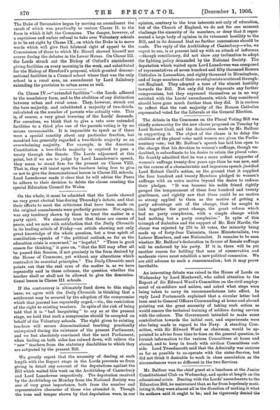We greatly regret that the necessity of dealing at such
length with the Report stage in the Lords prevents us from giving in detail any account of the deputations against the Bill which waited this week on the Archbishop of Canterbury and Lord Lansdowne respectively. The deputation received by the Archbishop on Monday from the National Society was one of very great importance, both from the number and representative character of those who attended it. Though the tone and temper shown by that deputation were, in our.
Iopinion, contrary to the true interests not only of education, but of the Church of England, we do not for one moment challenge the sincerity of its members, or deny that it repre- sented a large body of opinion in its vehement hostility to the Bill, and in its demand that no further concessions should be made. The reply of the Archbishop of Canterbury—who, we regret to see, is at present laid up with an attack of influenza —.-though conciliatory, did not show any inclination to adopt r the fighting policy demanded by the National Society. The deputation which waited upon Lord Lansdowne was composed of representatives of seven hundred and fifty thousand Roman Catholics in Lancashire, and eighty thousand in Birmingham, and of large numbers of their co-religionists scattered through- out England. They adopted a tone of the utmost hostility towards the Bill. Not only did they deprecate any further compromises, but they expressed themselves as in no way satisfied with the Lords' amendments, which they considered should have gone much further than they did. It is curious to reflect that the vast majority of the Roman Catholics represented voted for the Liberals at the General Election.






























































 Previous page
Previous page